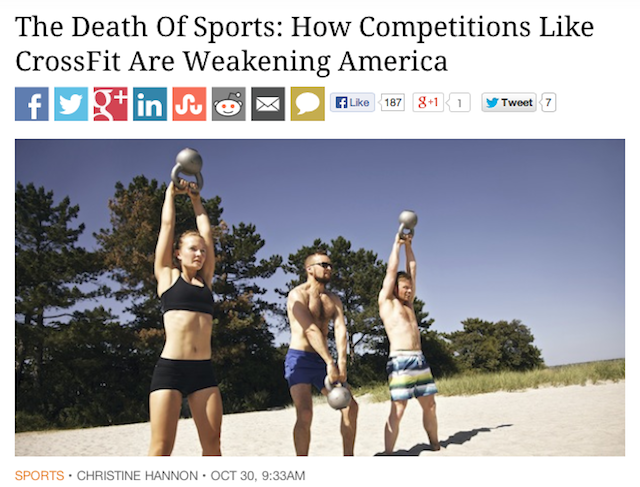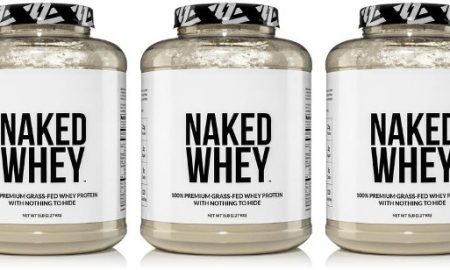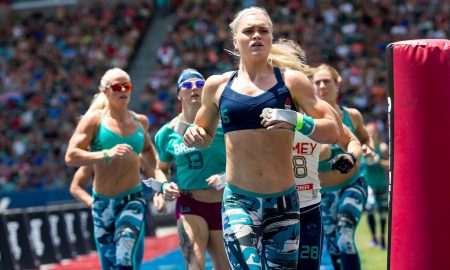
Christin Hannon’s Article Published on EliteDaily.com
I’d like to begin by stating that I believe everyone is entitled to his or her own opinions. When it comes to CrossFit, I have my own opinions as well. Despite having multiple CrossFit training certifications, the Kool-Aid I drink is slightly watered down.
I’m a big fan of the “sport of fitness” and believe there are benefits to “constantly varied, high-intensity functional movements.” However, that does not mean I think CrossFit is perfect and, therefore, believe it should be subject to criticism when it is due.
With that said, I’d be remiss if I did not respond to an EliteDaily.com article posted October 30, 2013, by Christine Hannon titled, “The Death Of Sports: How Competitions Like CrossFit Are Weakening America.”
If I may try to summarize in my own words, Hannon states that sports are a dying breed thanks to physical events such as the CrossFit Games that are not traditional forms of competition and instead exist to create a “‘feel good about yourself’ environment.”
While today’s youth sports are criticized throughout the article, it is CrossFit specifically that appears to be the focus of Hannon’s scrutiny.
Not a Sport
Hannon starts out by explaining that CrossFit is not a sport, but rather a competition, stating: “While competing at CrossFit, there is nothing you can do to directly defend against your opponent. A sport has both elements: zero-sum and a defense.”
Included in her competition-but-not-sport category: Olympic lifting, powerlifting, and gymnastics, all of which she qualifies the main disciplines of CrossFit.
While a majority of people doing CrossFit are in it for fitness and health, the sport/competition aspect comes into play with the CrossFit Games, an annual competition held to find the ‘Fittest on Earth’, which is what I will speak to directly.
In Hannon’s article, it’s her definition of “sport” is what I find bothersome. Merriam-Webster.com defines “sport” as “a contest or game in which people do certain physical activities according to a specific set of rules and compete against each other.” In searching, I could not locate one dictionary making any mention of zero-sum or defense elements.
By Hannon’s definition, quite a few activities would fall from the “sport” category, including track and field, ice skating, swimming, luge, diving, and ski jumping. What’s interesting about this list, is that all are current events of the Olympic Games, one of the longest standing sporting events known throughout the world, and an organization many would consider the authority on what is and is not a sport.

Day 2 of the 2013 CrossFit Games at the StubHub Center
Winners and Losers
Whether the CrossFit Games is, or is not, a ‘sporting’ event could simply be an argument of semantics. However, it’s Hannon’s negative view of competition (not sport) that is concerning.
As Hannon states, “Many competitions are mistakenly identified as sports because our socially liberal society wants everyone to feel included in sports. We are moving past the generation of loyalists and the focus is on the individual and how the individual feels.”
Hannon directly compares CrossFit to a trend in youth sports where scores are no longer kept and instead everyone receives a “high five and certificate of participation.”
Her criticism of both youth sports and CrossFit is that there is a lack of losers. I agree with Hannon when she states, “We learn through losing. We excel through specializing. Losing does not mean we are done playing. It means we figure out what went wrong and innovate to do better next time.”
The reason I agree is because I’ve completed WODs where I’ve come in last–many times, in fact. You know what that feels like? Losing. Just because I have someone cheering me on as I work and congratulating me when I eventually finish doesn’t mean that I haven’t learned from the situation, or that I intend to quit. Instead I’m going to listen to the feedback from my coaches and CrossFit peers to understand how I can improve for next time.
And not to ignore the elephant in the room, but I’m pretty sure if you asked Jason Khalipa, Ben Smith, or any individual male not named “Rich Froning” if he won the CrossFit Games in the past three years, he would definitively answer “no.” If you weren’t the winner, than you were a loser, and not someone who simply doesn’t “qualify for the next level”, as Hannon describes CrossFit winners and losers.
Lack of Focus
Hannon disagrees with the parents of children in multiple sports, stating, “…[the children] play three sports and [the parents] hope for a scholarship in one. Chances of a scholarship for the truly gifted and deserving athlete would be much higher if he focused on just one sport.”
She goes on to compare this to the constantly-varied nature of CrossFit: “Practically speaking, you cannot compete in a powerlifting meet one week and a triathlon the next and expect to win at both.”
Hannon is absolutely right, and the point she makes is something emphasized in the CrossFit Level 1 certification course. CrossFit doesn’t claim to offer multiple discipline workouts with the goal of making you great in one sport. In fact, the motto of the CrossFit Games is to find “the fittest person on Earth,” not the person with just the best snatch or fastest mile time.
That doesn’t mean someone who trains in CrossFit and looking to compete in a marathon won’t find benefits. After all, cross training of any kind helps to develop a wider breadth of muscles than single sport training alone.

2010 CrossFit Games Champion Kristan Clever at the 2012 USA Weightlifting American Open
Conclusion
While I agree with parts of Hannon’s article, I feel her critique of CrossFit may be unfairly founded.
In the closing paragraph of her piece, she gives the reader the advice to encourage youth sports to keep score, and high school students to choose one sport by their junior year. However, out of left field, she ends with: “As for CrossFit, just leave it alone. It’s a trend and its fire will burn out on its own.”
This statement isn’t directly supported throughout the article, and given Hannon’s background in fitness and personal training, it’s hard not to feel as though she is trying to counter the effects of CrossFit’s current success.
Trend or not, it is working for some people, and many who try it find a connection with fitness they may have never experienced before. In a nation where obesity and heart disease are leading causes of death, it seems now is the time for the fitness community to work together to inspire healthy lifestyles instead of selfishly trying to cheapen something popular.
To you, dear reader, I encourage you to read Hannon’s article for yourself and make your own opinions. Again, we are all entitled to our own. And these are simply mine.

















Follow Us